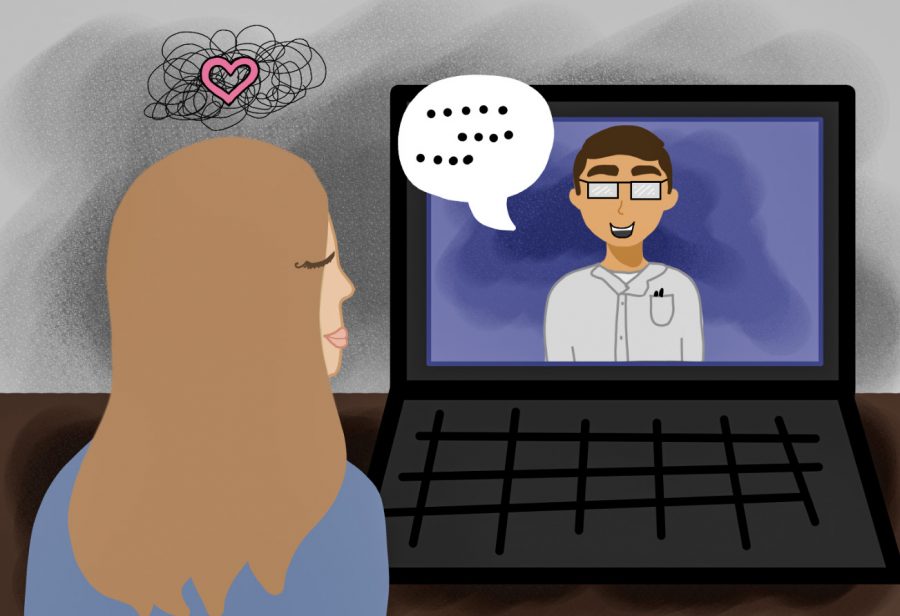Use of telemental health rises while individuals cope with pandemic
Virtual platform allows individuals to easily access counseling wherever they are, removes emotional aspects during therapy sessions
Struggles resulting from the pandemic have also been down-played, and many students do not feel their problems are significant enough to get therapy.
February 23, 2021
Telemental health appointments have become a more popular platform for counseling, allowing individuals to overcome personal struggles during the COVID-19 pandemic.
Chad Sanders, clinical psychologist at Palouse Psychiatry and Behavioral Health, said he conducted all his counseling appointments online when the pandemic began. Now, 85-90 percent of his counseling sessions are conducted virtually.
All age groups have been suffering from the effects of the pandemic and telemental health allows people to receive counseling regardless of where they are, he said.
There are some positive aspects that come with using telehealth, Sanders said. Individuals who normally would not be able to visit a clinic still have the opportunity to meet with their providers, like those who have recently undergone surgery and are in recovery.
Patients who have been forced to relocate during the pandemic have also found it useful to be able to meet with their providers, he said.
The pandemic significantly impacted the student population because there have been limited opportunities to socialize, Sanders said. This has led to students feeling isolated.
“College students here in town are facing a lot of the same things that the bulk of the population is dealing with social isolation, demoralization and right now with the weather, too,” he said.
Social isolation led to an increase in substance abuse because students are looking for something to do, Sanders said.
There have been many false rumors circulating or being advertised online, he said. These include internet recommendations for how to manage “tolerance breaks” and COVID-19 stress.
“There is a lot of bullshit right now online,” Sanders said. “Things that are idiosyncratic, things that are not evidence-based, a lot of kind of person-to-person advice. Those kinds of things can get you in trouble.”
Sanders said students who have normalized drug or alcohol use to the point of tolerance have come to the conclusion that they can take so-called “tolerance breaks,” where they stop using substances for a week before reusing them.
Struggles resulting from the pandemic have also been down-played, and many students do not feel their problems are significant enough to get therapy, he said. Individuals have a common misconception that everyone is struggling equally during the pandemic.
People may not seek therapy if they believe their issues or feelings are not significant compared to everyone around them, when in reality they should not let this hold them back, Sanders said.
“There is almost this climate of expectations for suffering,” he said.
Sanders said students should continue to have virtual social interactions to remain healthy, physically and mentally, during the pandemic. Individuals should also take breaks, go on walks or get out of the house regularly, even if it is brief.
It is also important to have a routine and practice mindfulness exercises or meditation if feelings of stress arise, he said.
In the past, there were struggles with insurance covering telemental health appointments because they were hardly used before the pandemic, he said.
Sanders said he predicts that as long as insurance continues to cover telemental health, there will probably always be some degree of virtual healthcare.
However, there are still negative aspects to using telemental health, Sanders said.
“You don’t have quite a connection with a person,” said Mike Berney, executive director at Palouse River Counseling.
Virtual settings remove more of the emotional aspects of therapy, and true psychotherapy is always better in person. There is also the possibility of poor internet connection and interruptions, Berney said.
“With Zoom, you have this bottleneck where there’s just a screen that you’re looking at and you can miss out on some of the nonverbals,” Sanders said.
Exposure therapy, which is used to address post-traumatic stress disorder, can be hard to properly use in a virtual setting, he said.
Counseling centers have gradually begun incorporating more in-person counseling, Berney said. However, the opportunity is selective and being made on a case-by-case basis.
Changes will continue to be made in the following months, but it appears that healthcare in a virtual setting will stay for now, he said.










